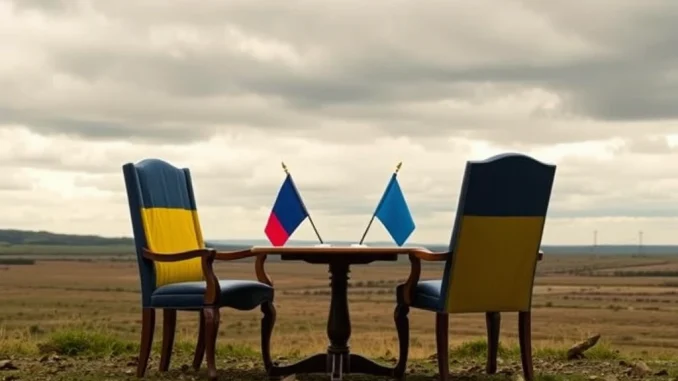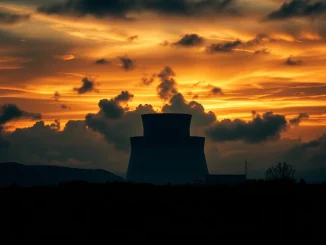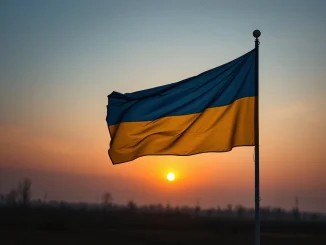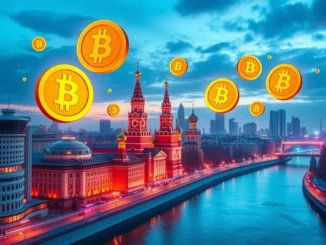
Global events, especially those involving major geopolitical shifts, often send ripples across financial markets, and the world of cryptocurrency is no exception. Investors and market watchers keep a close eye on international developments, as they can significantly influence sentiment and volatility. A recent development regarding the potential Russia Ukraine Peace Talks has captured attention, highlighting the ongoing Geopolitical Risk in the region and its potential contribution to broader Market Uncertainty.
What’s Happening with Russia Ukraine Peace Talks?
Reports indicate that Russian President Vladimir Putin has decided not to attend upcoming peace talks planned for Istanbul. This decision directly responds to a condition set by Ukrainian President Volodymyr Zelensky, who had stated he would only participate in face-to-face negotiations with Russian officials if President Putin was personally present.
Here’s a breakdown of the situation:
- Zelensky’s Stance: The Ukrainian leader expressed a clear requirement for Putin’s direct involvement in any high-level peace discussions. This condition aimed to ensure that any agreements reached would have the highest level of commitment from the Russian side.
- Putin’s Response: President Putin has reportedly declined to attend, effectively rejecting Zelensky’s condition for participation in the Istanbul talks.
- Location Significance: Istanbul has previously served as a venue for negotiations between the two nations, seen as a neutral ground facilitating dialogue.
Why Does This Matter for Market Uncertainty and Investors?
While seemingly a political matter, the progress, or lack thereof, in resolving international conflicts like the one between Russia and Ukraine has tangible effects on global economies and markets. The decision by Vladimir Putin to skip the talks underscores the current deadlock and increases Market Uncertainty.
Consider these points:
- Lack of Resolution: Continued conflict and stalled peace efforts mean prolonged instability. This uncertainty makes investors hesitant, potentially leading to risk-off sentiment across various asset classes, including cryptocurrencies.
- Economic Impact: The conflict has already disrupted global supply chains, energy markets, and commodity prices. A lack of a clear path to peace suggests these disruptions could persist, impacting inflation, economic growth, and ultimately, investment climates.
- Investor Sentiment: News of failed or cancelled talks can negatively impact investor confidence. When major leaders like Volodymyr Zelensky and Vladimir Putin cannot even agree on the terms for discussion, it signals that a resolution is distant, fueling pessimism.
How Does Geopolitical Risk Connect to Crypto?
Cryptocurrencies, while often seen as uncorrelated assets, are not immune to macro-economic and geopolitical forces. Increased Geopolitical Risk can influence the crypto market in several ways:
Historically, during times of significant global tension or economic instability, investors have sought different strategies:
| Scenario | Traditional Investor Behavior | Potential Crypto Reaction |
|---|---|---|
| High Uncertainty / Risk-Off | Move to perceived safe-havens (e.g., gold, certain government bonds), reduce exposure to volatile assets. | Initial sell-off alongside other risk assets, or potential flight to certain cryptocurrencies perceived as ‘digital gold’ depending on the nature of the crisis. |
| Prolonged Instability & Inflation | Seek inflation hedges, diversify away from traditional currencies/assets. | Increased interest in Bitcoin and other cryptocurrencies as potential stores of value or alternatives to traditional financial systems, especially in affected regions. |
| Resolution / De-escalation | Increased confidence, move back into risk assets. | Potential rally as broader market sentiment improves. |
The current situation, with Russia Ukraine Peace Talks stalled due to Vladimir Putin‘s decision, falls into the high uncertainty category. This reinforces the existing Geopolitical Risk landscape that investors must navigate.
Navigating the Uncertainty: What Insights Can Investors Gain?
For those involved in the crypto space, understanding these broader geopolitical factors is crucial. The news about Volodymyr Zelensky‘s condition and Putin’s refusal isn’t just political news; it’s a signal about the likely path of the conflict and its ongoing impact on global stability and markets.
Key insights:
- Volatility Factor: Geopolitical events are significant drivers of market volatility. Be prepared for potential price swings influenced by news headlines.
- Long-Term View: While short-term reactions can occur, assess how prolonged instability might affect the long-term adoption and perception of cryptocurrencies.
- Diversification: Consider how geopolitical factors fit into your overall portfolio diversification strategy.
The decision by Vladimir Putin not to attend talks requested by Volodymyr Zelensky is a setback for diplomatic efforts and contributes to the prevailing Market Uncertainty stemming from the Geopolitical Risk of the conflict.
Conclusion: Stalled Talks Add to Global Unease
The news that Vladimir Putin will not attend peace talks in Istanbul, effectively rejecting the condition set by Volodymyr Zelensky, underscores the significant challenges in finding a diplomatic resolution to the conflict. This development maintains a high level of Geopolitical Risk on the global stage, feeding into broader Market Uncertainty that investors across all asset classes, including cryptocurrency, continue to monitor closely. Progress towards peace would likely ease some of this uncertainty, but for now, the path forward remains unclear, demanding vigilance from market participants.



